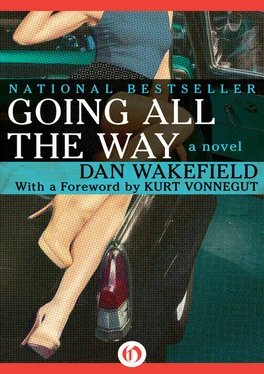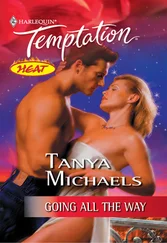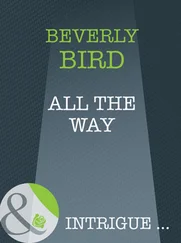The Times was the only paper in town that supported Democrats sometimes, but that was probably because it was part of a national chain, and maybe because of that it wasn’t as widely read as the Star and the News . Some people didn’t quite trust the Times , maybe because it supported Democrats sometimes or maybe because it was owned by outsiders.
“Shawl likes artists, though,” Gunner explained. “They’re more in line with his own views about things.”
“His views?”
“Yeh, you know. Against the status quo and all.”
“Oh.”
Gunner said it casually, as if there was nothing to worry about. Sonny just hoped old lady Armbrewster never got a load of Shawl and his crowd. She’d have J. Edgar Hoover on them in nothing flat.
Besides Shawl himself there was another guy there who wasn’t really an artist but was pissed off at the status quo. His name was Eddie Messner and Sonny remembered him because he used to play ball for Shortley. When Sonny was a kid only eight or nine years old, he started reading everything in the sports page and he knew the names of all the Shortley players, who seemed like remote gods to him, even the reserves. Messner hadn’t been a star but he fought his way into the starting lineup in his senior year. He was what the sports pages call a “watch-charm guard,” which meant that even though he was only a little bastard, the coach had stuck him in the line with the monsters who slogged around and battered the shit out of each other and were trampled all over by the backs and never got the glory. Sonny had also seen Messner officiating some of the football games at Shortley when Sonny was taking pictures for the Echo . Officials made a little money for working a game but mainly they were old jocks who liked to do it just to have an excuse to wear a uniform again. Messner didn’t like his real work very much, which was selling vacuum cleaners, but it gave him time to knock off when he wanted and officiate a ball game. Sonny remembered once before a ball game Messner was in the locker room talking to some of the guys about his crummy job, telling them they better get their glory and enjoy it now ’cause soon enough they’d be peddling some damn thing just like him. It really depressed Sonny, hearing an older guy talk like that to a bunch of young guys.
Sonny’s dislike for Messner got even worse because of the way he was acting at the party. He was flirting around with the fat girl art student, just like she was his own age or something. Sonny thought it was pretty crummy for old bastards in their thirties to horse around with young girls like that. Messner seemed pretty drunk, and Sonny wondered if he was Irish. He looked like he might be. He was small and wiry and had the kind of thin red hair that showed the freckles on the top of his head. He was sitting on the mattress thing on the floor in a corner of the room, practically trying to feel up the fat girl right in public. Sonny wished if the guy had to fool around he’d pick on the blond gal in the chair, who was more his own age. She looked real lonely and probably would have liked the attention, even from Messner.
Just when Sonny was thinking all that stuff about the guy, Messner suddenly yelled out real loud, “Hey, Casselman—are you the great Gunner?”
Everybody turned to look, and Gunner just said, “I’m Casselman.”
“Didn’t reck-a-nize ya at first. Didn’t expect to see a Big Rod out slumming with us oddballs.”
“What do you mean slumming?” Gunner said.
Messner laughed, but it wasn’t a funny laugh. “They had the same system back when I was at Shortley,” he said. “I know all about the Big Rods. They stick together, they don’t give a tumble to the peasants.”
“Jesus, man,” Gunner said, “that was high school .”
“Once a Big Rod, always a Big Rod.”
Gunner shook his head, disgusted like, and took a swig of his beer.
But Messner wouldn’t let up. “I played ball, too,” he said. “Even started my senior year. But that’s not enough to be a Big Rod. You gotta come from the right background. Your old man has to belong to the country club and have a big house set back on Meridian Street or Washington Boulevard.”
Gunner looked like he couldn’t believe what he heard. He raised his own voice for the first time. “You’re fulla shit, man.”
Gunner was right. There were plenty of rich kids who never made the In Group, yet some of the Big Rods—Gunner himself, in fact—were from families that seemed to barely scrape by, and the kids had to work part time.
If they played ball they had to work on weekends or nights or get up at five in the morning and carry Star routes with a couple of hundred customers, or maybe do all that stuff. Just being rich couldn’t make you a Big Rod, but evidently that’s what Messner had made for his own excuse. It must have made him sore as hell to beat his brains out making the football team and still not get In, so he had to blame it on something that wasn’t his fault, like his family not being in the bucks. At least Sonny never fooled himself that way. He knew damn well you didn’t get to be a Big Rod just by being rich, or even good-looking, or even a good athlete—you had to have some quality that was hard to pin down, a certain kind of confidence, a little swagger but not in a boastful way, an easiness, a style, an air of casual good nature, of leadership that wasn’t sought but seemed to come natural. You couldn’t pin it down but you could see it in a person.
“You’re telling me I’m fulla shit?” Messner said, pointing a thumb at his chest, as if to make sure.
“You are if you believe that crap about money,” Gunner said. “My old man traveled for Goodyear and he kicked off when I was ten. My old lady got a job as a saleslady at Ayres, I got a morning Star route and set pins at the Broad Ripple bowling alley. In the summer, when I got old enough, I worked construction and caddied on the weekends. We lived in a double at Thirty-ninth and Winthrop and the Monon railroad went right in back of the house and the whole place shook like an earthquake had hit whenever a train went by. You call that a big social country-club background?”
“Whatya want us to do, cry in our beer?” Messner said.
“No, man—just quit crying about what happened to you in high school. For Christ sake, man, how old are you now? How long have you been out?”
“I’m old enough not to have to take any bullshit from a punk like you.”
Messner got to his feet and hitched up his pants. He had on a pair of old brown slacks, a moldy-looking T-shirt, and tennis shoes without any socks.
Without planning it or thinking about it, Sonny found that he was standing up too, facing Messner. He was scared shitless of fights, but something deeper than fear was moving him now.
“He’s my friend,” Sonny said. “He isn’t any punk. You shouldn’t say that.”
“You gonna stop me, you little suck-off?”
“For God sake, Eddie, sit down!” yelled the lady who was sitting all alone. Messner didn’t pay any attention to her, didn’t even act like he heard. Sonny stood rooted in his place, ready for whatever had to happen.
“You shouldn’t say terrible stuff to people,” Sonny said. He heard his voice from far away, like it was coming from someone else.
“You trying to suck off the Big Rod, huh?” Messner said.
“Hey, Messner, just take it easy, man, O.K.?” Gunner said evenly. He didn’t move from his place on the floor.
Marty put her arm around Gunner and said, “Go have a beer, Eddie.”
That seemed to make Messner even madder, and little red splotches came out on his cheeks, like a disease.
“So, your suck-off buddy has to protect ya, and even your hot little piece of tail has to protect ya, huh?”
Читать дальше












